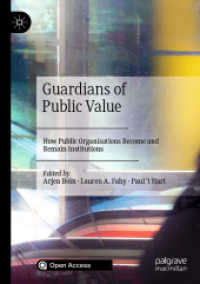- ホーム
- > 洋書
- > 英文書
- > Politics / International Relations
Full Description
Today, political leaders and candidates for office must campaign in a multimedia world through traditional forums—newspapers, radio, and television—as well as new digital media, particularly social media. Electoral Campaigns, Media, and the New World of Digital Politics chronicles how Twitter, Facebook, Reddit, email, and memes are used successfully and unsuccessfully to influence elections. Each of these platforms have different affordances and reach various audiences in different ways. Campaigns often have to wage different campaigns on each of these mediums. In some instances, they are crucial in altering coverage in the mainstream media. In others, digital media remains underutilized and undeveloped. As has always been the case in politics, outcomes that depend on economic and social conditions often dictate people's readiness for certain messages. However, the method and content of those messages has changed with great consequences for the health and future of democracy.
This book answers several questions: How do candidates/parties reach audiences that are preoccupied, inattentive, amorphous, and bombarded with so many other messages? How do they cope with the speed of media reporting in a continuous news cycle that demands instantaneous responses? How has media fragmentation altered the campaign styles and content of campaign communication, and general campaign discourse? Finally and most critically, what does this mean for how democracies function?
Contents
Introduction - David Taras
Chapter 1: Owning Identity: Struggles to Align Voters during the 2020 U.S. Presidential Election
Daniel Kreiss, University of North Carolina; Shannon McGregor, University of Utah; and Regina Lawrence, University of Oregon
Chapter 2: Trending Politics: How the Internet has Changed Political News Coverage
Kevin Wagner, Florida Atlantic University, and Jason Gainous, University of Louisville
Chapter 3: Feminism, Social Media and Political Campaigns: Justin Trudeau and Sadiq Khan
Kaitlyn Mendes, University of Leicester and Diretman Dikwal-Bot, De Montfort University
Chapter 4: A Women's Place is in the (U.S. ) House: An analysis of issues women candidates discussed on Twitter in 2016 and 2018 Congressional elections
Heather K. Evans, University of Virginia's College at Wise
Chapter 5: Two Different Worlds; The gap between the interests of voters and the media in Canada in the 2019 Federal Election
Chris Waddell, Carleton University
Chapter 6: The Agenda building power of Facebook and Twitter: The Case of the 2018 Italian General Election
Sara Bentivegna, University of Rome, Rita Marchetti and Anna Stanziano, University of Perugia
Chapter 7: "Many thanks for your support": Email Populism and the People's Party of Canada
Brian Budd and Tamara Small, University of Guelph
Chapter 8: Benjamin Netanyahu and online campaigning in Israel's 2019 and 2020 elections
Michael Keren, University of Calgary
Chapter 9: Stabbed democracy: How social media and home views made a populist president in Brazil
Francisco Brandao, University of Brasilia
Chapter 10: Memes; a New emerging logic: Evidence from the 2019 British General Election
Rosalynd Southern, The University of Liverpool
Chapter 11: Populists and social media campaigning in Ukraine: The Election of Volodymyr Zelensky
Larisa Doroshenko, Northeastern University
Chapter 12: The changing face of political campaigning in Kenya
Martin Ndlela, Inland Norway University of Applied Sciences
Chapter 13: Social media as strategic campaign tool: Austrian political parties use of social media over time
Uta Russman, FH Wien University of Applied Sciences
Chapter 14: "Many thanks for your support": Email Populism and the People's Party of Canada
Chris Wells, Blake Wertz, Li Zhang, and Rebecca Auger, Boston University
Conclusion - Richard Davis







